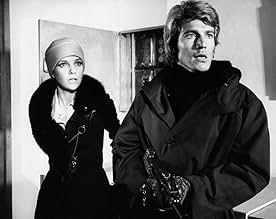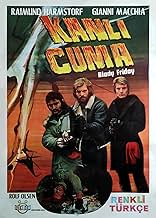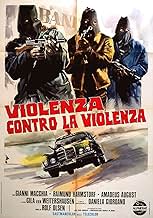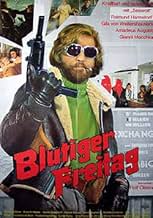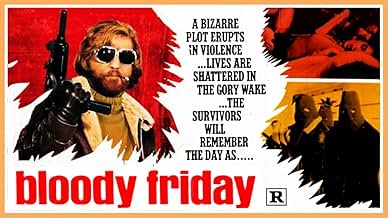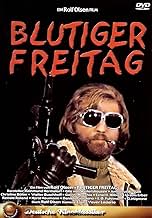NOTE IMDb
6,6/10
735
MA NOTE
Ajouter une intrigue dans votre langueWhen terrorists rob a bank all hell is let loose.When terrorists rob a bank all hell is let loose.When terrorists rob a bank all hell is let loose.
- Réalisation
- Scénario
- Casting principal
Totò Mignone
- Franz Muhl
- (as Ottone Mignone)
Claudius Casagrande
- Niki
- (non crédité)
Robert Furch
- Mann im Justizpalast
- (non crédité)
Karin Glier
- Nickys Mutter
- (non crédité)
Imo Heite
- Amerikanischer Soldat
- (non crédité)
Avis à la une
This is just a great, over the top story of a bank heist gone wrong with the greatest bad boy of movie history, Raimund Harmstorf. Chock full with (visual) violence, cheap FX and really the greatest trash talk of all times. And Gila von Weitershausen as the naive bit on the side isn't too bad either.
In this hard-boiled German-Italian production, Heinz Klett (Raimund Harmstorf), an anarchistic, mad-dog criminal, orchestrates a tricky escape from a Munich courthouse, right out from under the noses of police guards. With his gang -- Luigi (Gianni Macchia), Army deserter Christian (Amadeus August), and Christian's pregnant sister, Helen (Christine Böhm) -- Heinz next plans to rob the Deutsche Finanzbank so he can escape Germany and retire.
The heist is a bungled affair, as there isn't much money in the vault. But the robbers take ten hostages, including the heiress to a supermarket empire, and capitalize on the situation by demanding a million dollars in ransom and various modes of transportation out of the country. The police must contend with both the robbers and citizens who try to take over the investigation at every turn. In a marked contrast to how an American action film might depict a similar crisis, the cautious German constabulary readily accedes to all of Heinz's demands.
When Heinz and company receive the ransom money, they hijack a few of the hostages, including the heiress and a lesbian businesswoman who isn't impressed by Heinz's macho posturing. They get sidetracked to a country cabin, where the robbers' loyalties deteriorate. When a sympathetic Christian helps the heiress escape, she tips off the cops. Heinz rapes and murders the lesbian, while Luigi dies from an accidental gunshot wound. The cops surround the cabin and gun down Heinz, Christian, and Helen.
BLOODY FRIDAY is remarkable for not glamorizing its criminal protagonists, which was not the norm for crime movies of the late 60s and early 70s. It is only when the robbers are finally ambushed that director Rolf Olsen's staging makes a play for sympathy -- be they misguided youth or misunderstood human trash, did they deserve to die? Well, yes.
Olsen, who was more comfortable dabbling in lightweight sex films and mondo's, crams enough incident into the plot to keep our interest. The robbers' heist and subsequent flight from justice recalls every cliche in the book, but some scenes are remarkable -- the suspenseful escape from the courthouse; a toddler carrying a hand grenade outside the bank as if it were a toy; the massacre of the protagonists (equipped with extra large blood squibs); and a remarkably unpleasant rape scene, which is superimposed over slaughterhouse and, if you watch closely, hardcore sex footage.
Most of the cast underplays, which makes Harmstorf's intense performance as Heinz seem better than it is. However, his "Sea Wolf" is amusingly trashy, that of a cigar-chomping, machine gun wielding psychotic.
For those with a background in the social climate of 1972 Germany, one can discern the film's political subtext, with pointed references to Baader-Meinhof and the climate of social malaise that motivates the desperate thieves, as well as the ease with which they nab guns and start terrorizing the upper-class establishment.
The heist is a bungled affair, as there isn't much money in the vault. But the robbers take ten hostages, including the heiress to a supermarket empire, and capitalize on the situation by demanding a million dollars in ransom and various modes of transportation out of the country. The police must contend with both the robbers and citizens who try to take over the investigation at every turn. In a marked contrast to how an American action film might depict a similar crisis, the cautious German constabulary readily accedes to all of Heinz's demands.
When Heinz and company receive the ransom money, they hijack a few of the hostages, including the heiress and a lesbian businesswoman who isn't impressed by Heinz's macho posturing. They get sidetracked to a country cabin, where the robbers' loyalties deteriorate. When a sympathetic Christian helps the heiress escape, she tips off the cops. Heinz rapes and murders the lesbian, while Luigi dies from an accidental gunshot wound. The cops surround the cabin and gun down Heinz, Christian, and Helen.
BLOODY FRIDAY is remarkable for not glamorizing its criminal protagonists, which was not the norm for crime movies of the late 60s and early 70s. It is only when the robbers are finally ambushed that director Rolf Olsen's staging makes a play for sympathy -- be they misguided youth or misunderstood human trash, did they deserve to die? Well, yes.
Olsen, who was more comfortable dabbling in lightweight sex films and mondo's, crams enough incident into the plot to keep our interest. The robbers' heist and subsequent flight from justice recalls every cliche in the book, but some scenes are remarkable -- the suspenseful escape from the courthouse; a toddler carrying a hand grenade outside the bank as if it were a toy; the massacre of the protagonists (equipped with extra large blood squibs); and a remarkably unpleasant rape scene, which is superimposed over slaughterhouse and, if you watch closely, hardcore sex footage.
Most of the cast underplays, which makes Harmstorf's intense performance as Heinz seem better than it is. However, his "Sea Wolf" is amusingly trashy, that of a cigar-chomping, machine gun wielding psychotic.
For those with a background in the social climate of 1972 Germany, one can discern the film's political subtext, with pointed references to Baader-Meinhof and the climate of social malaise that motivates the desperate thieves, as well as the ease with which they nab guns and start terrorizing the upper-class establishment.
"Whatever they can do in Italy, we can do better" they must have thought in Germany. Extremely violent crime thrillers were very popular in Italy during the early 70's and at least a dozen of awesome ones got released every year. "Bloody Friday" is more or less Germany's response to this successful trend and a damn perplexing one, I may add! When the heavy criminal Heinz Klett escapes police custody during his transport to court, he promptly executes his plans to commit the biggest bank robbery ever in the history of the country. He, his regular partner and his girlfriend's brother storm into the bank heavily armed and take 10 people hostage. While the police attempts to gather the $1.000.000 ransom, and entire media circus unfolds outside on the streets. You usually know pretty much exactly how this kind of movie develops. Things don't go according to plan, there's the Stockholm Syndrome and a couple of unplanned deaths along the way. Apparently the film is inspired by similar real-life events as they occurred in Germany. I don't know which parts of the film were fictionalized, but I seriously wonder if the real events ended in such a nauseating and shocking bloodbath as well. I hope not. Probably the greatest accomplishment here is the biting social satire. While the hostage is going on inside, the public outside shouts for the re-implementation of the death penalty and there are even are some sly businessmen that unscrupulously want to make money out of the gathered crowd. It's certainly also not a film for people with an easily upset stomach or tangled nerves. Heinz' escape is bloody already and there's massively shocking sequence involving a hand grenade at the beginning of the hold-up. "Bloody Friday" is well-directed (by the guy who did "Shocking Asia"), the acting performances are pretty great and everything else (music, editing, photography, atmosphere) is simply in-your-face brutal and confronting.
This is a film about a bank robbery, with little concern for other's well being. The lead is a self centered egotistic homicidal maniac. He surrounds himself with people he can control. He has no respect for women. Lots of violence, some shooting & deaths, really low budget. There is a rather interesting sex scene where the lead & a consenting hostage have different views about sex, I thought it had a realistic ring to it. I rented this under the title Violent Offender. I thought that it was enjoyable if you can get past the low budget.
Relentlessly tough and mean-spirited bank robbery drama is straightforwardly made as a sleazy actioner, populated throughout with disagreeable characters, but actually is not any much more than that (despite having gained a certain cult status).
Le saviez-vous
- AnecdotesIn 2015, Subkultur Entertainment started a crowdfunding campaign via Kickstarter to restore the film which was successful. During the restoration it was discovered that the soundtrack was longer than the film itself. This resulted in raiding the vaults at the production company Lisa Film. There, a film reel was discovered which contained scenes cut to obtain a rating from the FSK. In the end, the original director's cut was restored in 4K resolution.
- Versions alternativesGerman theatrical version was cut to secure a "Not under 18" rating. Only in 2017 the uncut version was released on DVD/Blu-ray.
Meilleurs choix
Connectez-vous pour évaluer et suivre la liste de favoris afin de recevoir des recommandations personnalisées
Détails
- Durée1 heure 34 minutes
- Rapport de forme
- 1.66 : 1
Contribuer à cette page
Suggérer une modification ou ajouter du contenu manquant

